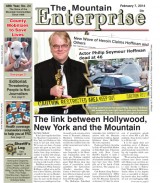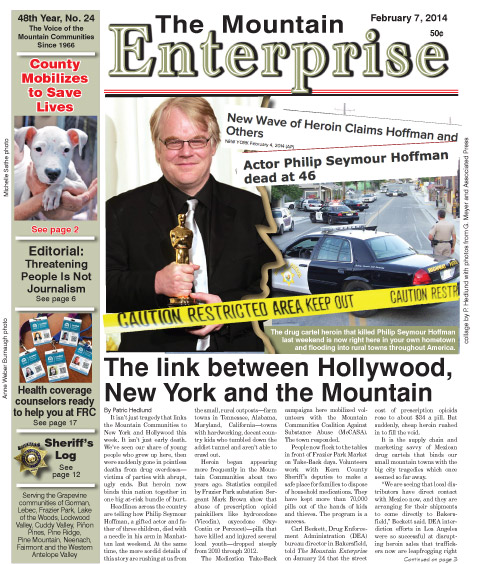By Patric Hedlund, Editor
Last month I had to explain to an 11-year-old boy that we could not accept a present that he brought to the office to thank us for some press coverage. I told him we reported about his accomplishments because they are newsworthy, not because we expected something in return.
We had to tell him that a journalist does not accept gifts.
We do not ask for favors.
We do not accept payments for news coverage.
We do not even let other people buy our lunch.
Sometimes it is not easy.
But a perception of conflict of interest is as bad as a conflict itself when it comes to maintaining credibility.
Our only criteria for deciding what news to cover is whether it serves the public. Ethics matter.
Firewall
The Mountain Enterprise has a strict firewall between the journalism side and the advertising side of our office. That means we do not decide what news to report based upon who does or who does not advertise in our pages.
We would never tell someone that we will not cover their events or threaten to cause trouble with their boss or event sponsors if they do not advertise with us or won’t give us a favor. Yet a local spammer is using such tactics in our town.
Self-interest is bias.
If an emailer trumpets that he is “unbiased” and “professional” and then tries to intimidate or extort or threaten members of the community—whether for advertising, or favors, money or information—that person is not a journalist. That person is a bully.
A dozen victims of this behavior have contacted us in distress. They are people you know and respect in this town. It is time to speak up.
Watchdog or lapdog?
Journalists serve the public, but we are not part of the government. We are supposed to be watchdogs whose greatest duty is to pursue and report the truth.
If a reporter—or someone who wants to be seen as a reporter— snuggles up to be too cozy with a politician, public official, a powerful business interest or celebrity, that person becomes a flack—a publicity agent—not a journalist.
They deserve to lose credibility. They have compromised their ability to serve the public as their highest priority. They have another master.
We have all seen that happen too often recently, both locally and nationally.
Competition has rules
In the United States, journalists like scoops. We work hard to develop stories. We are competitive. Part of our job is to develop sources. Sources have rights too. They deserve to be treated with consideration.
Similarly, if someone takes other people’s writing and passes it off as their own, they should not be called a reporter. They should be called a plagiarist.
In this newspaper, we strive to tell where the facts and information we report come from. That is called ‘attribution,’ and it matters.
Trust and guidelines
At The Mountain Enterprise, we work with our attorneys and ethics consultants often. For instance, this editorial and the evidence it is based upon has been reviewed by an attorney.
The Society of Professional Journalists’ Ethics Committee, the California Newspaper Publishers Association, The International Society of Weekly News Editors, The National Newspaper Association and The Poynter Institute are all sources we consult frequently when we are laboring over ethical guidelines.
That may help explain why this newspaper has been honored to win numerous state and national awards over the years from our peers for public service and reporting. We are always trying to do a better job for you. Every single issue, every single story, we care about deserving your trust.
That is what journalists do.
To see full stories with photos, please go to The Mountain Enterprise e-Edition
(login required)
You can have your newspaper delivered via mail! Just call 661-245-3794.
Also, this story and others are available right now at newsstands throughout the Mountain Communities.
This is part of the February 7, 2014 online edition of The Mountain Enterprise.
Have an opinion on this matter? We'd like to hear from you.


